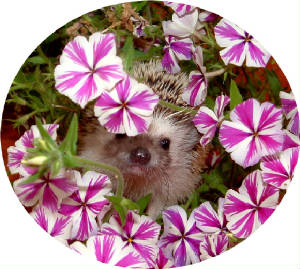|

Hedgehog, sugar glider, sto, short-tailed opossum, duprasi, squirrel, mouse, mice, rats, rabbit,
bunny, chinchilla, hamster, gerbil, rat, birds, guinea pig, degu, jird, dormouse, lemming, jerboa, prairie dog, chipmunk,
ferret, skunk, agouti, belgian hare, english lop
A bit about African Hedgehogs
By heritage-pets.com
An adult male Hedgehog is referred to as a ‘Boar’
An adult female Hedgehog is referred to as a ‘Sow’
A colony of Hedgehogs is often referred to as a ‘Herd’
A group of babies are commonly referred to as a nest, array or a prickle and a single baby hedgehog is referred to as a ‘piglet,
hoglet or pup’.

The following is a very quick overview of some important things people should know and need
to think about before they purchase a new hedgehog (a.k.a. ‘hedgie’).
- They are a native of Africa and have become established in some parts of the Mediterranean
and Middle East. In the wild the hedgehog’s home range varies from the steppes located at the edge of the Savannah to
the Mediterranean coastal areas. Being that they are from a tropical climate they do require a warm environment in which to
thrive.
- They are solitary animals who only come together to breed. They prefer not to live in the company
of another hedgehog. Two or more males will almost always fight. On occasion females may co-exist together in what appears
to us as companionship but in reality they are actually just two animals who have been put together by well-intended humans
and forced to tolerate living with each other. This usually does not work out as well as we hoped it would. Even after living
together for extended periods of time two females may, without provocation, turn on each other. Although hedgehogs are not
nasty with other species they can become very aggressive towards their own kind and can cause serious physical injury to one
another. We strongly suggest that all hedgehogs be housed in separate cages.
- In the wild hedgehogs seldom live to be two years of age but in captivity many hedgehogs live
to be 4-5 years of age. I have heard of some living a few years longer, however that is a rarity.
- In the wild they are considered nocturnal animals meaning that they tend to be more active
at night but in captivity they are adjusting their habits and are slowly becoming diurnal. Although they are still more active
at night they do come out to eat and exercise throughout the day. These changes are likely happening because of their lack
of fear from predation.
- They are mainly insectivores (insect eaters) but also will eat small rodents, bird’s
eggs as well as a small amount of fruit and vegetable matter. Those living in close proximity to ponds and streams also eat
small crustaceans, invertebrates and small fish that have been stranded on the shoreline. Being that they are predominantly
insectivorous their diet must primarily consist of good quality, highly digestible animal protein. In captivity this can be
achieved by providing them with a premium quality, commercial cat food, supplemented by boiled chicken, egg, shrimp, beef
heart or other cooked meats. Many breeders choose to feed live insects but this is not really necessary as long as you are
feeding a good high quality meat based diet. There are several brands of commercially prepared hedgehog foods on the market
but hedgehogs can be fussy. Small quantities of fruits and veggies should be included regularly as these items help vary and
compliment their diet, as do small amounts of low fat cheese, yogurt and skim milk powder. As all hedgehog owners already
know, hedgehogs can be very fussy. Many refuse to eat certain prepared foods, certain fruits, veggies and even treats. You
may need to be patient when offering new food items to your pet. For very fussy hedgehogs, I find the best way to coax them
into trying new food items is to keep offering it at regular scheduled times. Be careful not to over feed your hedgehogs as
they have a tendency to become obese very quickly… they do love to eat!
- Fresh, CLEAN! Water is a must! It needs to be available at all times. It is best supplied in
bottles, as many hedgehogs will often overturn their water bowl during their never-ending search for more food.
- Hedgehogs are considered by many to be a relatively long-lived pocket pet.
- Hedgehogs need open-air well ventilated, clean, roomy cages. They also need time out of their
cage everyday so that they have room to explore and roam. There are many commercially constructed open-air cages available
that are suitable for housing a hedgehog. The larger the better! Be sure to have a tight fitting top/lid as hedgehogs do have
a tendency to climb.
- They require a nest box or someplace to hide in while they are resting. A well-vented plastic
hide box is suitable and the plastic types are the easiest to clean. Ideally the hide box should be around 8-10 inches square
with an opening of around 4 inches square and it should not have a permanent floor.
- For bedding, one can use Aspen wood shavings. Aspen can also be used for nesting material and
good quality clean, kiln dried hay is enjoyed by many hedgehogs inside the hide home. Some hedgehogs enjoy covering themselves
while they are sleeping.
- Be sure your hedgehog gets lots of exercise by providing a solid exercise wheel in their cage
and also allow them time out of their cage to roam, while supervised.
- Don’t be misled by breeders telling you it is okay to keep them in things like Rubbermaid
storage containers and such. These storage boxes are less expensive and therefore used by a few unethical breeders who feel
they can house more animals in less space in order to produce more babies. Although hedgehogs do require sleeping dens, they
are not cave dwellers! Imagine any animal living in a box for 4-5 years! Yikes…it does not take a rocket scientist to
figure out that storage boxes are for storage …Not for animals to live in!
- If you have heard that hedgehogs are hypoallergenic… it is a false statement. Hedgehogs
are not hypoallergenic. Just like anything else, a person can be allergic to hedgehogs. Like other animals, a hedgehog’s
saliva contains proteins, some of which many people do react to. Although allergic reactions to hedgehogs are not considered
a common allergy, a person also needs to consider that hedgehogs are not really that common of a pet. Before choosing a pet
hedgehog, be sure to spend a bit of time with the animal before you bring it home. If you do react to it negatively you may
be allergic to it. If you are determined and still want to keep a hedgehog as a pet, there are a few ways to help you build
up a tolerance and perhaps you might react less to them. Try bathing the animal regularly with an organic shampoo (that does
not contain TEA TREE oil), which may help by removing the excess dander. Tea tree oil is believed to be toxic to hedgehogs.
- We at Heritage-pets.com are not anti Pet Store but in our opinion, Pet Stores are usually not
a great place to buy this type of pet. Often pet shop employees are not that familiar with hedgehogs. Many do not know enough
about nor do they care enough to learn about hedgehogs. Therefore they are not in a position to offer any advice to prospective
buyers. Many hedgehogs sold in pet stores do have a tendency to be un-socialized, because they often do not get handled everyday.
(Usually employees don’t have the time to play with them enough and some are even intimidated by their quills). Once
a hedgehog is timid it can be worked with until it builds up a trust for a new owner but it can be a challenge and it may
take patience to get them calm again. Normally, a social hedgehog, once it is familiar with a persons scent, does not use
its' quills, unless they are frightened or startled.
- For a pet from a good breeder you can expect to pay around $175.00 and up for a normal coloured
male hedgehog. Some of the newer more unusual colour morphs tend to be rarer and therefore more costly than a normal grey
or brown hedgehog. Males usually are a bit less expensive and the females tend to be around 25 % or higher priced than males.
Although most hedgehogs are still considered a reasonably priced pet, for a nicely marked pinto or other rarer fancy colours
you can expect to pay from $250.00 and up, depending on the lineage of the animal.
|

